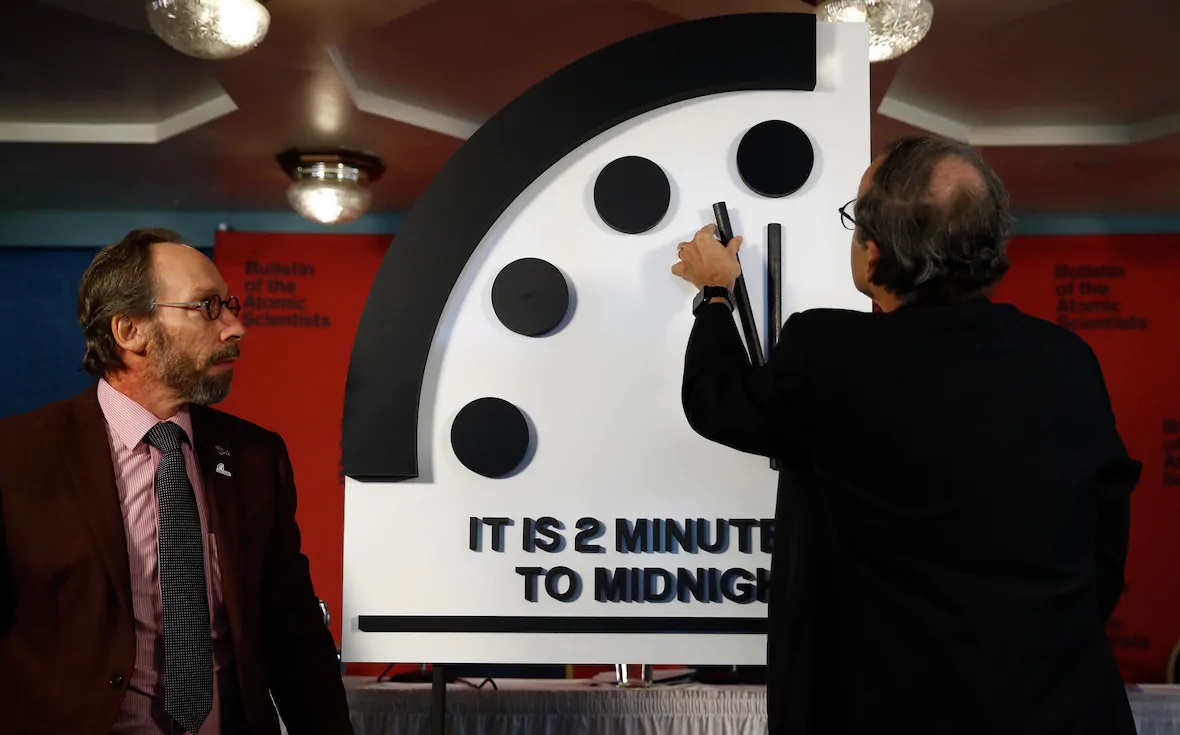Announcement Comes As Nuclear, Climate, and Tech Issues Dominate An Unsettled World Stage; Experienced World Leaders to Join Bulletin Experts on Climate and Nuclear Warfare.
WASHINGTON, D.C. – NEWS ADVISORY – The Bulletin of the Atomic Scientists will host a live international news conference at 10 a.m. EST/1500 GMT on Thursday, January 23rd, 2020 to announce whether the minute hand of the iconic “Doomsday Clock” will be adjusted. The decision is made by the Bulletin of the Atomic Scientists’ Science and Security Board in consultation with the Bulletin’s Board of Sponsors, which includes 13 Nobel Laureates.
The factors contributing to the decision about the Doomsday Clock time will be outlined today.
The Doomsday Clock did not move in 2019. However, the Doomsday Clock’s minute hand was set forward in January 2018 by 30 seconds, to two minutes before midnight, the closest it has been to apocalypse since 1953 in the early years of the Cold War. Previously, the Clock was moved from three minutes to midnight to two and a half minutes to midnight in January 2017. Click the image below to watch the live stream of the news announcement.

News event speakers for the Doomsday Clock announcement on January 23rd, 2020 will include:
- Former UN Secretary-General Ban Ki-moon, deputy chair, The Elders; and former South Korean Foreign Minister;
- Former California Governor Jerry Brown, executive chair, Bulletin of the Atomic Scientists;
- Former President of Ireland Mary Robinson, chair, The Elders; and former UN High Commissioner for Human Rights;
- Rachel Bronson, president and CEO, Bulletin of the Atomic Scientists;
- Robert Rosner, William E. Wrather Distinguished Service professor, Departments of Astronomy & Astrophysics and Physics at the University of Chicago; and chair, Science and Security Board, Bulletin of the Atomic Scientists;
- Sharon Squassoni, research professor, Institute for International Science and Technology Policy, Elliott School of International Affairs, The George Washington University; and member, Science and Security Board, Bulletin of the Atomic Scientists;
- Robert Latiff, member, Science and Security Board, Bulletin of the Atomic Scientists; fellow, University of Notre Dame Institute for Advanced Study; and member, Intelligence Community Studies Board, and the Committee on International Security and Arms Control of the National Academies of Sciences, Engineering, and Medicine; and
- Sivan Kartha, member, Science and Security Board, Bulletin of the Atomic Scientists; and senior scientist, Stockholm Environmental Institute.
For the Silo, Alex Frank & Max Carlin.
